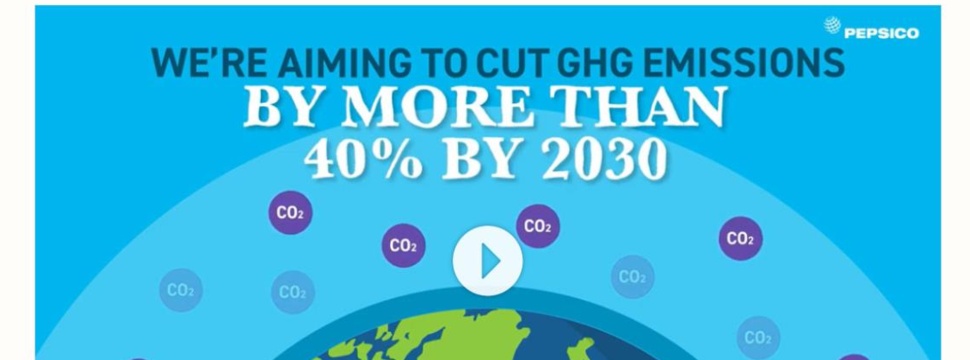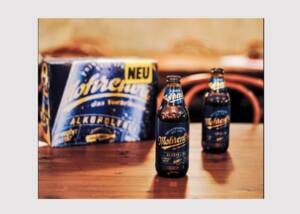Pepsico: We've doubled our climate goal and pledge net-zero emissions by 2040
News General news
We have announced plans to more than double our science-based global climate goal, targeting an absolute reduction of greenhouse gas (GHG) emissions across our value chain by more than 40% by 2030. In addtion, we're also pledging to achieve net-zero emissions by 2040, one decade earlier than called for in the Paris Agreement.

Specifically, we're planning to reduce absolute GHG emissions across our direct operations (Scope 1 and 2) by 75% and our indirect value chain (Scope 3) by 40% by 2030 (2015 baseline). This action is expected to result in the reduction of more than 26 million metric tons of GHG emissions or the equivalent of taking more than five million cars off the road for a full year.
“The severe impacts from climate change are worsening, and we must accelerate the urgent systemic changes needed to address it.
Climate action is core to our business as a global food and beverage leader and propels our PepsiCo Positive journey to deliver positive outcomes for the planet and people. Our ambitious climate goal will guide us on the steep but critical path forward -- there is simply no other option but immediate and aggressive action.”
(RAMON LAGUARTA, PEPSICO CHAIRMAN AND CEO)
Our emissions target aligns to the Business Ambition for 1.5°C pledge and has been approved by the Science Based Targets initiative as the most ambitious designation available through their process.
Our action plan is centered around mitigation, reducing GHG emissions to decarbonise our operations and supply chain, and improving resilience through reducing vulnerabilities to the impacts of climate change by continuing to incorporate climate risk into business continuity plans. Across Europe, PepsiCo has already reduced our total emissions by 6% since 2015, in line with global reductions, and our new comprehensive emissions reduction plan will focus on priority areas such as agriculture, packaging, distribution and operations.
The path to 40% absolute emissions reduction for PepsiCo is focused on the following:
- With agriculture accounting for approximately one quarter of worldwide GHG emissions and one third of PepsiCo’s global emissions, the company will further scale sustainable agriculture and regenerative practices that help lead to emissions reduction and sequestration, as well as improved soil health and biodiversity, decreased deforestation, and increased productivity for farmers.
- Cutting potato-based carbon emissions by 70%
Walkers has announced new technology to produce a low emission fertiliser, made from potato waste at its Leicester factory. Once supplied at scale, the fertiliser is expected to reduce the business’s potato-based carbon emissions by 70% (estimated reduction from a 2019 baseline).
- Moving to 100% recycled plastic bottles
We will lower GHG emissions' impact with a continued drive to reduce virgin plastic use and increase recycled content in our packaging. This includes a recent announcement to move all ready-to-drink beverages in Great Britain into 100% recycled plastic (rPET) bottles by the end of 2022. A move which will also reduce the carbon footprint of our ready-to-drink bottles by up to 40%.
- Reducing carbon emissions through Sustainable Farming
We're already working with UK farmers to reduce carbon emissions through our Sustainable Farming Programme. This includes a partnership with the University of Aberdeen to develop the innovative Cool Farm Tool, which allow our growers to identify, measure and ultimately cut their carbon footprints.
- Environmentally sustainable manufacturing
Through the implementation and upgrading of environmentally sustainable manufacturing, warehousing, transportation and distribution sites, we're aiming to maximise efficiency in our supply chain, while also adopting zero- and near-zero-emission technologies:
- In the UK, all manufacturing sites have sourced 100% renewable electricity for more than three years.
- 25% of our Skelmersdale site uses electricity generated by an on-site wind turbine.
- 25% of the electricity used at our Walkers Crisps factory in Leicester – the world’s largest – is generated by our anaerobic digestor.
- We've also sent zero manufacturing site waste to landfill since 2011.
In addition to this, we're working with our suppliers to transition to low and zero emissions fuel in our logistics, while also expanding the use of AI technology to enable better route planning to reduce emissions in distribution.
Reducing snacks packaging by 30%
We've reduced the amount of plastic used in our multipack packaging by an average of 30% for many of our most popular products, including Walkers, Quavers, Monster Munch and Wotsits.
“PepsiCo’s new climate goal will double our efforts on emission reductions. This impacts both our company-owned businesses but also includes our suppliers and bottlers. Simply put, we all have to do more,” says SILVIU POPOVICI
CHIEF EXECUTIVE OFFICER, PEPSICO EUROPE.
PepsiCo is implementing innovative business processes that enable GHG emissions mitigation, such as its “Sustainable from the Start” programme, which puts environmental impact decision-making at the heart of product design. Doritos STAX – packaged in a widely recyclable triangular tube with a resealable, recyclable flip-up lid - was designed through this programme.
Additionally, two internal carbon pricing programmes, one aimed at eliminating the carbon impact of employee business air travel and another at building carbon impact into carrier selection for third party logistics will help further reinforce climate considerations in PepsiCo’s business decisions.
As part of an ongoing commitment to use PepsiCo’s scale and reach to influence the broader food system, PepsiCo is engaged in multiple coalitions aimed at driving action on climate change, including the One Trillion Trees initiative, The Climate Group’s RE100 and We Are Still In.










